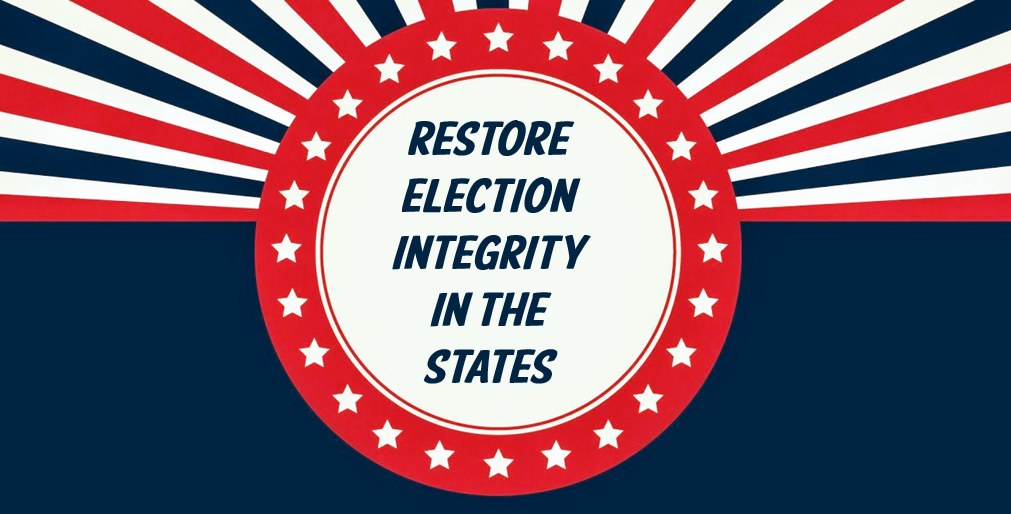Voter fraud and election insecurity remain clear and existential threats to our Republic’s electoral system. Thankfully, there is much that state legislatures can and should do.
Both Article I, Section 4, and Article II, Section 1, of the United States Constitution give state legislatures primary authority over federal elections. Our legislators must exercise this authority to restore confidence in our elections. First and foremost, they must reclaim this power from judges and executive branch bureaucrats.
Certain state laws and election practices encourage and enable fraud more than others. One example of this is the trend away from voting in-person on Election Day. This includes the practice of “ballot harvesting,” a term referring to state laws that allow “third parties — like campaign workers — [to] collect absentee ballots from voters and deliver them to election officials.” Broadly legal in twenty-four states including California, ballot harvesting is particularly susceptible to fraud, whether by intimidating and coercing voters or by stealing or manufacturing ballots. In one notable example, an illegal ballot harvesting scheme was discovered in Minnesota, and in another example, allegations of ballot harvesting led to the annulment of a 2018 North Carolina congressional election. Ballot harvesting must be abolished.
Similarly, early and absentee voting pose risks to voter integrity. Early voting and same-day registration should be abolished. Absentee ballots should be limited to those who can prove they will be out of town on election day or are physically incapable of making it to a polling place.
In addition to promoting in-person voting on Election Day, state legislators must make vote-counting transparent and with a paper trail. As election expert Kurt Hyde points out, state election laws have become increasingly less transparent, with increased difficulty for voters to monitor vote-counting, and election authorities increasingly rely on electronic equipment rather than paper ballots. Hyde also notes that the precinct is declining in relevance. Thus, election results should be printed on paper, posted at the precincts, and made public immediately to prevent tampering with vote totals by insiders as well as external hackers. Additionally, internet voting, as well as internet voter registration, should be abolished, and voters must be allowed to monitor their elections.
Non-citizen voting is another threat to election integrity. Multiple examples exist of non-citizen voter fraud, often because of laws giving driver’s licenses to illegal aliens and other lax driver registration policies. In one example, observers pointed out that a New York law allowing driver’s licenses for illegals could enable illegal alien voting, and in other states like Texas, no citizenship checks exist when registering to vote. Safeguards must be enacted to ensure that non-citizens do not vote. A voter ID will take care of this problem. States need strong voter ID laws, so long as they take privacy concerns into account.
The rushed changes to state voting laws due to the coronavirus pandemic have also increased the risks to election integrity. Multiple states relaxed security measures for mail-in ballots including five that, for the first time, automatically mailed ballots to every registered voter. The main problem with this is that the voter rolls are inaccurate. For example, the Public Interest Legal Foundation found in 2020 that nearly 350,000 deceased people remained on the voter rolls in over 40 states, and over 50,000 people voted more than once. Additionally, left-wing groups attempted to overturn other safeguards against fraud, including witness signature requirements and anti-ballot harvesting laws. Mail-in voting should end, voter rolls should be cleaned up, and the electoral changes enacted because of COVID-19 must be reversed.
Last, but not least, Article I, Section 4, of the Constitution allows Congress to override state regulations for federal elections. If Congress enacts laws that further undermine election integrity, state legislatures must ensure that state- and local-level elections remain secure regardless of the condition of federal elections. One method to accomplish this is to hold state and local elections on different dates as federal elections. Kentucky, Louisiana, Mississippi, New Jersey, and Virginia already do this for certain state-level elections.
The bottom line is this: state legislators must reassert their constitutional authority over federal elections. They must promote in-person voting on Election Day only, enact vote-counting transparency, and ensure that only paper ballots are used with a strong emphasis on the precinct. Already, many state legislatures have introduced bills that solve these problems.
Urge your state legislators to enact substantive election reforms such as these. The integrity of our Republic and public faith in our electoral system is at stake.
Although we provide a way to easily email legislators, we know from long experience that it takes a lot more interaction with your legislators to get your point across than that provided by emails alone.
That's why we provide an easy way not only to email them, but to contact them by phone, tweet, and even video message them.




